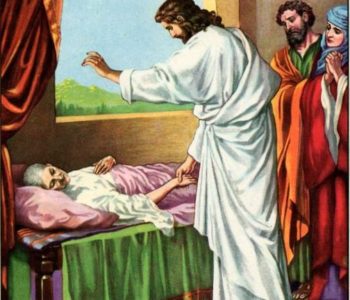 She is a fringe character who leaves the Biblical narrative as quickly as she shows up and yet; she is the nameless figure who calls into question one of the Church’s more controversial policies. She is Peter’s mother-in-law, the matriarch of the pontificate and quite possibly the thorn in the Vatican’s side lo these many years.
She is a fringe character who leaves the Biblical narrative as quickly as she shows up and yet; she is the nameless figure who calls into question one of the Church’s more controversial policies. She is Peter’s mother-in-law, the matriarch of the pontificate and quite possibly the thorn in the Vatican’s side lo these many years.
Now, I don’t claim to be a marketing genius, nor someone who understands all of the ins and outs of building a brand. However, if I were out to create an order of holy, celibate men to head up a new, universal religion designed to last until the end of time, I think I would have the good sense to start off with a group of guys who weren’t already married to begin with. Or, at the very least, I would have taken all in-law references out of the primary text.
But Peter’s mother-in-law is in there so I have to believe there is a reason for that. The gospel writers are not known for including a lot of extraneous details that do not add to the overall narrative so why bring this woman up but not Peter’s wife and/or children? Call me crazy, but if she weren’t important to the story, she would have been written out after the first draft. More than 2,000 years later though, she’s still in there and I have to assume her presence serves a purpose.
Although we do not know the backstories of every apostle (I’m looking at you, Thaddeus) we know some were fishermen, one was some kind of an IRS agent, at least one was a member of a rebellion, and one was a crook but Peter is the only one known to be a family man. The Church really likes to gloss over this fact because it doesn’t lend itself well to the whole “priests can’t be married” rule. But here’s the thing – the Bible only mentions a mother-in-law, not Peter’s wife. So, what’s going on here?
Look, it doesn’t make any sense that Jesus would have taken Peter away from a family who needed him. And if God called Peter to the sacrament of marriage (the only sacrament that predates Christ), why would He change up that vocation midstream and leave the spouse high and dry? Either God is incredibly cruel, indecisive as it pertains to one’s life purpose or we are missing the point. I’m going to go out on a limb here and say it is the latter.
The brief appearance of Peter’s mother-in-law shows that Peter was indeed a family man. While he may have been a young, childless widower or an older one whose grown children had already left home, he clearly has some kind of obligation to his ailing mother-in-law and cannot run off to join Jesus’ ministry. However, in these two sentences, we see Jesus fulfill God’s plan for Peter’s life rather than disrupt it. Peter cannot be the rock upon which Christ will build His church if he has a commitment to another “bride” or her mother. It will require all of his time, love and energy to be the man Jesus needs him to be and so in healing the mother-in-law, Jesus frees Peter from his primary familial obligation and enables him to become the priestly leader he is meant to be.
Jesus may have said, “leave all things you have” but he’s not one for turning His back on people. Heck, his own mother traveled with His movement at one point, so do you really think He had a problem with marriage and family? The lesson to be learned here is that we are all called to a vocation of service whether we are single or married and sometimes, it is not an either/or proposition. Sometimes, it is both/and similar to today’s permanent deacons. Today’s gospel reading shows how Peter’s vocation evolved from a one-time married fisherman into a preeminent apostle and the first pope. No question about it, there were roadblocks and obligations that probably complicated the decision making process – but if God has called you, He will stop at nothing to make you His. He will clear your path and ease your mind about the choice ahead so that you can follow Him with confidence…even if your mother-in-law may be standing in the way.
Today’s readings for Mass: LAM 2:2, 10-14, 18-19; PS 74: 1B-2, 3-5, 6-7, 20-21; MT 8:5-17
